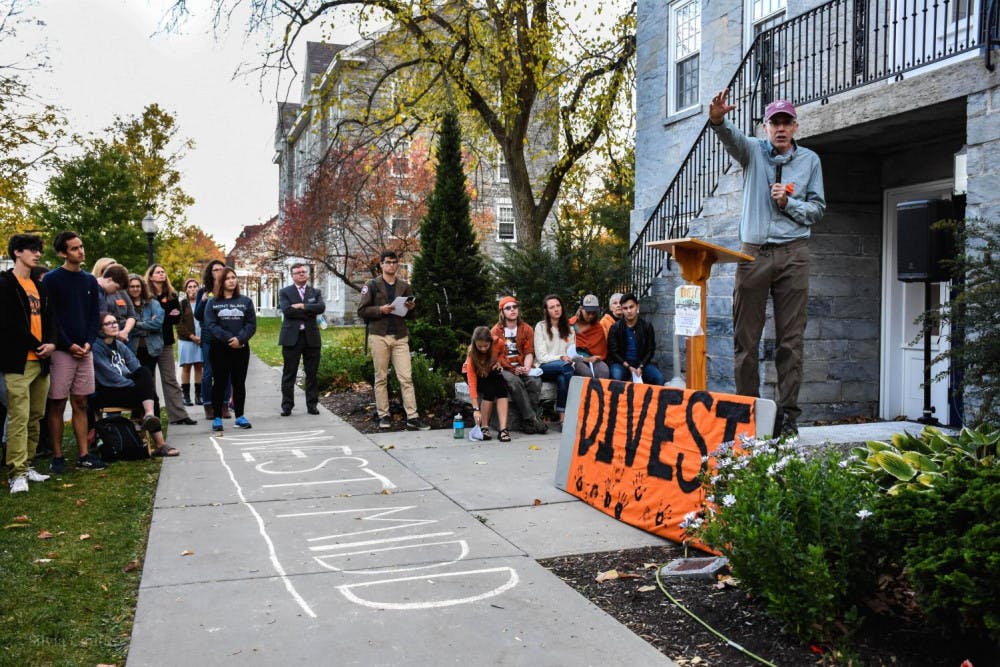As Middlebury’s board of trustees convened inside Old Chapel on Thursday, Oct. 19, members of the college community rallied outside to renew a years-long call for the college to divest from fossil fuels.
The event, described as a teach-in, was organized by the student group Divest Middlebury. Scheduled to coincide with the trustees’ annual fall meeting, the event featured speeches by three students and three community members.
“The place we love is not behaving in the way that we need it to behave,” said Bill McKibben, an environmental activist and scholar at the college, who headlined the event. “It’s not a very hard thing that we’re asking.”
Divest Middlebury calls for the college’s board of trustees to withdraw all investments that the college holds in any of the top 200 fossil fuel corporations—a ranking maintained by the environmental advocacy group Fossil Free. The college’s endowment, managed by the firm Investure, currently invests $60 million in corporations on that list.
The Divest Middlebury campaign began in 2012, and the board of trustees voted against divestment that same year. A resolution supporting divestment was passed by the Student Government Association (SGA) in 2013, and a 2017 SGA survey showed that 67% of the student body supports divestment.
Alec Fleischer ’20.5 delivered the first student speech, providing an overview of the divestment movement and its goals. Fleischer then led the crowd in a chant of “Stand up, fight back,” intending to be heard by the trustees inside Old Chapel.
Esteban Arenas-Pino ’18 spoke next, focusing on Middlebury’s history of student protest.
“In May 1969, 250 students staged a sit-in in Coltrane to demand the faculty take a position on the role of ROTC on campus and the dissolution of the department of military science,” he said. “Clearly, since then, the campus legacy has been one of activism.”
Arenas-Pino framed divestment as a matter of social justice, calling for the end of “carbon colonialism and the modern climate apartheid that renders those in the global south the most vulnerable to climate injustices caused by global warming.”
Emma Ronai-Durning ’18.5 voiced similar sentiments. “Divestment has called attention to the essential connections between capitalism and racism in creating climate destruction,” she said.
“[The trustees] missed an opportunity to be leaders in environmental justice, climate justice and what they claim they stand for,” she said. “Today, as the board continues to hide behind its guise of neutrality, students haven’t taken no for an answer. We see that there is only one answer: that’s organizing.”
Non-student speakers focused on the impacts of climate change already being felt in Addison County. “It poured rain for three months here,” said Fran Putnam, a Weybridge resident. “The farmers who normally plant their corn the middle of May, they planted their corn on July 6.”
McKibben discussed the trustees’ past failure to divest, and the movement’s continued importance.
“I had high hopes so that Middlebury could be the first place to divest, and we really had it lined up. It was great, everybody here talking” he said. “Sadly, Middlebury whiffed. The trustees weren’t quite up to it then, couldn’t bring themselves to do it.”
McKibben emphasized that the growing renewable energy sector, in conjunction with an unstable fossil fuel industry, makes divestment an economically sound choice. “We’re moving away from fossil fuels. That’s the past, not the future,” he said.
“It behooves, in this place in particular, the board of trustees to pay some attention to the moral authority of the people who will have to live through the crises that we are now creating,” he said, invoking the elder generations of which he and many trustees are a part. “We’re going to be dead before climate change hits at its absolute worst.”
The crowd at the protest matched the leaves on the trees, wearing the orange that has come to symbolize the divest movement. Despite the blustery weather, attendance exceeded one hundred students.
Bea Lee ’20.5 was one of them. “I want to do more than wear a piece of orange felt on my backpack,” she said.




